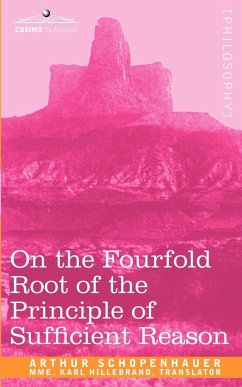
On the Fourfold Root of the Principle of Sufficient Reason
Versandkostenfrei!
Versandfertig in über 4 Wochen
15,99 €
inkl. MwSt.
Weitere Ausgaben:

PAYBACK Punkte
8 °P sammeln!
Schopenhauer is perhaps best known for his 1818 work "The World as Will and Representation" and developed an enduring reputation for his philosophical pessimism, in contrast to the idealism of Immanuel Kant. Much of Schopenhauer's work is a reaction to post-Kant German romanticism. Despite his failure to gain wide recognition for his philosophy during his lifetime, Schopenhauer has since become regarded as one of Western philosophy's most important contributors. First articulated by Gottfried Leibniz, the principle of sufficient reason states that all things must have a reason or cause. Revise...
Schopenhauer is perhaps best known for his 1818 work "The World as Will and Representation" and developed an enduring reputation for his philosophical pessimism, in contrast to the idealism of Immanuel Kant. Much of Schopenhauer's work is a reaction to post-Kant German romanticism. Despite his failure to gain wide recognition for his philosophy during his lifetime, Schopenhauer has since become regarded as one of Western philosophy's most important contributors. First articulated by Gottfried Leibniz, the principle of sufficient reason states that all things must have a reason or cause. Revised and republished in 1847 "On the Fourfold Root of the Principle of Sufficient Reason" is an elaboration on the classical principle of sufficient reason by Arthur Schopenhauer which he wrote for his doctoral dissertation in 1813. In this work, Schopenhauer articulates a central thesis to his philosophy, one which he would consistent refer to in later works as a necessary starting point for readers to fully comprehend his philosophy. This edition is translated by Mme. Karl Hillebrand and is printed on premium acid-free paper.










![Aristotle's Psychology [microform]; a Treatise on the Principle of Life (De Anima and Parva Naturalia) Cover Aristotle's Psychology [microform]; a Treatise on the Principle of Life (De Anima and Parva Naturalia)](https://bilder.buecher.de/produkte/65/65633/65633554n.jpg)

